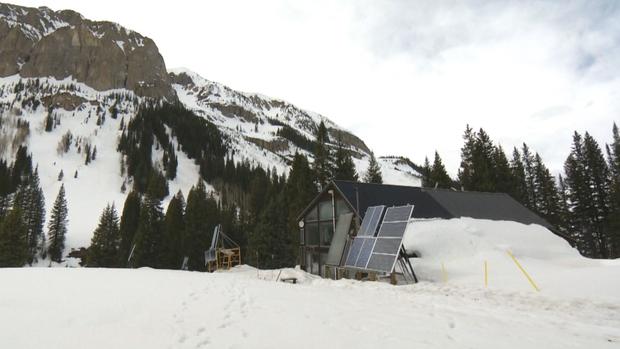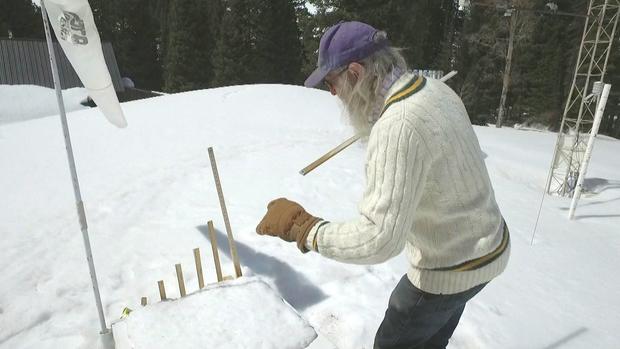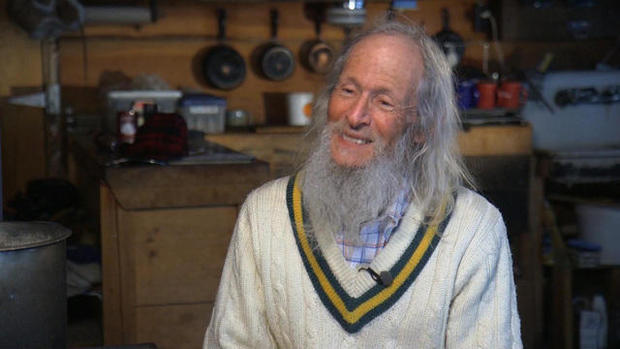GOTHIC, Colo. -- A springtime visit to Billy Barr’s place in the Colorado Rockies is no simple journey. To avoid a three-mile cross country ski from the nearest paved road, first you need a forest service permit. Then you hitch a ride like ours, courtesy Dave Ochs and his Crested Butte Mountain Bike Association.
But it’s all worth it when you discover a remote cabin deep in the woods is home to one of the world’s most valuable – and unexpected – troves of scientific data.

Billy Barr’s cabin
“So I came out late May, summer of ‘72,” Barr said. “It was such a mental relief just to have peace and quiet in my life.”
He lived in a shack that was 8 by 10 feet, he said.
“The wind would literally blow snow through the cracks,” Barr told CBS News correspondent John Blackstone.
“You came for the solitude, but you started to get a little bored?” Blackstone asked.
“A bit of boredom, but a lot of it was just… making my own activity,” Barr said.
Since 1974, he’s taken measurements twice a day, but it wasn’t just the snow depth and when it melted. Using a hand-operated system he built himself, he also calculated how much groundwater that snow would produce when it melted.

Billy Barr
When that wasn’t enough to keep Barr busy, he started tracking wildlife and recorded it all by hand in a series of now-tattered notebooks.
“You’ve gotta be a little obsessive though,” Blackstone said.
“Oh yeah!” Barr responded.
In the early ‘90s, scientist David Inouye from the neighboring Rocky Mountain Biological Laboratory needed data for his research on wildflowers. He had heard about Barr’s notebooks, but was shocked when he saw how comprehensive they were.

Billy Barr
“I said, ‘Billy! You know those data are really relevant to how the climate is changing, and how animals are responding to the changing climate,” Inouye said.
Barr said he had no idea his measurements would have any kind of long-term significance.
“Remember this was mid-’70s, early-mid-’70s,” Barr said. “If you asked me about climate change , I would’ve said, yeah, it got warm, I took my sweater off. I mean, it meant nothing to me!”
But now it means everything to the global scientific community, which has published his numbers in dozens of scientific papers.
“One of these days, I’ll read ‘em! Yeah,” Barr said. “I wasn’t out to prove anything. I just recorded the numbers.”
“This winter we’ve had 21 record highs, last winter 17, the winter before, 36!” Barr said at his weather station.
Like most climate scientists, Barr is concerned by what his numbers show: temperatures are rising and snow is melting earlier each year.
“It’s worrisome, obviously, it’s not a good trend,” Barr said. “Will we lose water storage? Will drought increase? Will floods and famine increase?”
But Barr leaves the answers to big questions like those to others. He’s content to do his part and head out into the wilderness, where there’s an infinite amount of data waiting to be collected.
http://www.cbsnews.com/news/colorado-billy-barr-climate-diarist-snow-wildlife-records/


He's been living in the mountains of Colorado, alone most of the time, since 1972 and has been taking notes on the weather, the snow and the animals since 1974, just because he was bored. Now those notebooks are the backbone of some seminal scientific research on the weather and it's changes and used by scientists around the world. If you agree with Global Climate Change or not (I do), he is still an amazing character. He's also not just some kook, as he also has his degree in Environmental Sciences from Rutgers. A very interesting person.
Here (below) is a more extensive story of his life in the mountains, his love for Bollywood movies and Cricket. It's a great read and well worth the while.
He is one amazing person.
He really is! An old hippie hermit (sort of) who is also a scientist with a degree from Rutgers and has, quite accidentally out of boredom, become a great help to climate scientists of today. I do sort of wonder what makes a person want to live alone in the mountains all of these years, but if it brings him peace, then more power to him.
But now it means everything to the global scientific community, which has published his numbers in dozens of scientific papers.
Yes, there really is scientific consensus on climate change
US President Barack Obama and British Prime Minister David Cameron have both observed that there is 97 percent agreement among climate scientists that humans are causing global warming. So too have US Secretary of State John Kerry and US presidential primary candidate Senator Bernie Sanders. Conversely, US Senator Ted Cruz and former US Senator Rick Santorum—current and former presidential primary candidates respectively—have both argued that the 97 percent consensus figure is “bogus.”
...............
How did consensus become such a contentious topic? And what, if anything, can be done about it? A new study showing that the “lack of consensus” claim is a myth may have some impact on the conversation.
The answer to the first question dates back to market research conducted around 2002. Frank Luntz, a Republican strategist and pollster, found that when people realised there was scientific agreement on global warming, their views on climate change altered accordingly. In a 2002 memo to the George W. Bush White House, Luntz advised Republicans that in order to win the public debate on climate policy, they should cast doubt on the scientific consensus. He wrote that “you need to continue to make the lack of scientific certainty a primary issue in the debate.”
Conservatives complied with this recommendation. An analysis of newspaper opinion pieces on climate change written by conservative columnists from 2007 to 2010 found that the most common argument was “there is no scientific consensus on climate change.” You can’t accuse conservatives of ignoring the evidence on climate change—at least, they didn’t ignore the market research on how to effectively confuse the public.
About a decade after Luntz published his climate strategy, social scientists began to catch up, realising the psychological importance of public perception of consensus. They labelled perceived consensus a “gateway belief” influencing a range of other climate beliefs and attitudes, including support for climate change mitigation policies. Social scientists began exhorting climate scientists to educate the public about their high level of agreement on human-caused global warming.
But the damage had already been done. Opponents of climate action had spent years casting doubt on the scientific consensus.
Now, we have a new resource to dispel the myth that there is a lack of scientific consensus on climate change . While a number of past studies have measured the level of scientific consensus on climate change, no one has published a summary of the many consensus estimates—until now. In a paper published in Environmental Research Letters on April 13, I collaborated with the authors of seven of the leading consensus studies to perform a meta-study of meta-studies synthesising the research into scientific consensus on climate change. (A meta-study combines the findings from multiple studies.) Among climate scientists, the estimates of consensus varied from 90 to 100 percent, with a number of studies converging on 97 percent , the very figure derided by Cruz, Santorum, and others opposed to action on global warming.
A key finding from our meta-study was that scientific agreement was highest among scientists with the most expertise in climate science. This meant that groups with lower climate expertise showed lower agreement on climate change. The group with the lowest level of agreement—at only 47 percent—were economic geologists, who study metals and minerals that can be used for industrial and economic purposes . Conversely, the group with the highest level of agreement—at 97 percent—were climate scientists who were actively publishing climate research.
In short, the greater the expertise, the greater the consensus. The dark side of this relationship is that it allows misinformers to cast doubt on consensus by selecting sub-groups of scientists with lower expertise in climate science, in order to argue that scientific agreement on human-caused global warming is low.
Our study finds that multiple studies have found an overwhelming consensus among climate scientists. The level of scientific agreement is overwhelmingly high because the evidence is overwhelmingly strong. The anti-science crowd has deployed the “fake experts” technique—using non-specialists to undermine what the most relevant experts say—to cast doubt on consensus. Our hope is that our new study will both improve public perception of consensus and inoculate people against misinformation.
The consensus is real. The idea that there is still a debate on Global Climate Change is a lie told by and to and believed only by idiots. The so called "debate" is over and done with. It is happening. Deal.
Thanks for not watching the video I posted . But I'm not surprised since you are incapable of understanding its content . Have fun spouting your leftist drivel points repeatedly . DUH !
You mean the 'scientists' at the Elmers Glue factory aren't being acknowledged as seriously as those who are actively monitoring the polar ice shelves? I'm sure Petey finds that to be highly discriminatory.
It amounted to gibberish.
I am going to bed so I am going to close this discussion until I get up when I will open it again. The last thing I need is some jerk complaining about my articles.